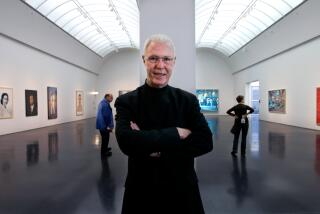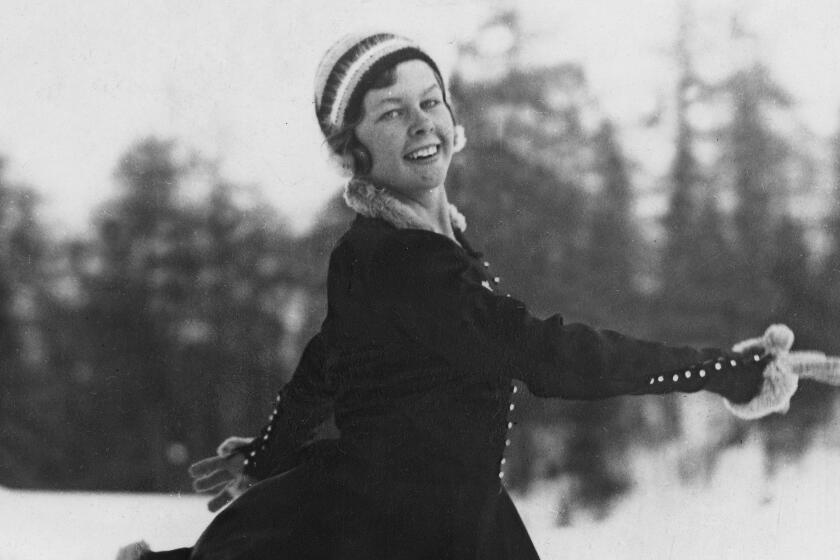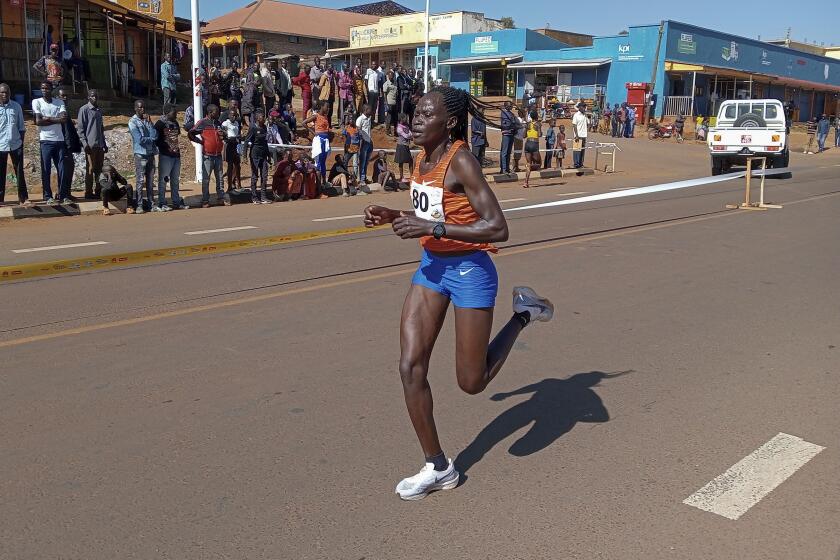Olympic Festival Isn’t Easy Sell in Los Angeles : Athletics: Already the home of two previous Olympics, Southland has demanding sports public.
The announcement was made two weeks ago that the 1991 U.S. Olympic Festival, the one awarded to Los Angeles, will open with the ice hockey competition on June 18 in St. Cloud, Minn.
Twenty-four days later, and roughly 1,800 miles to the west, the official opening ceremony will be held at Dodger Stadium.
Although the announcement might have been the first public indication that all is not well with this summer’s Festival, scheduled to begin 100 days from today, on July 12, and run through July 21, U.S. Olympic Committee officials began months before to second-guess the decision they made in 1987 to entrust their pet project to a sophisticated, perhaps jaded, sports market such as Los Angeles.
The Olympic Festival, known until 1986 as the National Sports Festival, was conceived by the USOC to give American athletes, particularly those in developmental years, experience in multisport competitions. It has been held 10 times--in every non-Olympic year since 1978--in eight cities.
From the first one in Colorado Springs, Colo., where 1,900 athletes in 25 sports, 80,000 spectators and 80 media members attended, it has grown into an event that last year in Minneapolis attracted 3,000 athletes in 37 sports, 503,679 spectators, 1,500 media members and 30 hours of national television coverage on ESPN.
In most cities that have staged the Festival, it has been greeted with only a little less fanfare than if it were the Olympic Games. But there is little chance that Los Angeles, having twice played host to the Summer Olympics, will mistake the Festival for the real thing, causing concern among some USOC officials that the city, while perhaps not yawning, will be less than fawning.
Local organizers are optimistic that Southern Californians will become increasingly enthusiastic about the Festival as the 1,700-mile, 27-day torch run winds through the state toward Los Angeles, similar to the Olympic fever that was sparked by the coast-to-coast torch run in 1984, but they admit that so far it has been difficult to generate excitement.
“It takes more to capture the public’s attention than we originally thought,” said Elizabeth Primrose-Smith, president of the organizing committee. “Then, when you capture it, it’s only for a short period. You know L.A.”
Primrose-Smith, 43, is the first woman to become chief executive of the Festival. A gold medalist in swimming at the 1963 Pan American Games, she re-entered sports on the business side as assistant executive director of the first World Games in 1981 and spent the next three years as an associate vice president of the L.A. Olympic Organizing Committee.
When she became the Festival organizing committee’s second president in August, 1989, she inherited a $100,000 debt. Until recently, it appeared as if she had dived into a bottomless pool of red ink. Last December, USOC officials said the L.A. Festival might have a $1-million deficit.
But Primrose-Smith, in an interview at her Broadway Tower office, credited a Dec. 19 meeting in Los Angeles between the local organizing committee and the USOC with producing cost-cutting measures that, along with recent sponsorship commitments, will bring the Festival within about $150,000 of its break-even goal if projected ticket sales are realized. With appeals to additional sponsors ongoing, she even speculated about the possibility of a slight surplus.
“We will not lose money,” she said. “I will not allow us to lose money, even if I have to cut the staff at the end of the Festival and wrap up the final report myself.”
USOC officials are relieved about the financial situation. Although the group is not contractually liable for debts incurred by the organizing committee, a catastrophe in one city could prevent others from bidding for future Festivals.
Instead, as a result of their experience with L.A.’s organizing committee, they said other cities will benefit because the USOC has been forced to become more cognizant of finances. For instance, travel instructions to athletes this year and probably in the future will be to arrive four days before their competitions begin instead of six in team sports, and two days before instead of four in individual sports.
“We didn’t want to do anything that would diminish from the competitive aspect of any of the sports,” said Don Porter, chairman of the USOC’s Festival Committee. “But when you start looking around, you can always find a little fat to trim.”
Sheila Walker, director of Olympic Festivals and Competitions for the USOC, said she sent letters detailing cuts to governing bodies for all 37 sports involved and has received no negative responses.
For the most part, the organizing committee did not have financial difficulties because it was unable to raise money. In fact, it already has raised more money than any previous organizing committee. Its biggest obstacle has been the cost of doing business in Los Angeles.
While the budgets for the last two Festivals, in Oklahoma City and Minneapolis, were $10.5 million and $7.5 million, respectively, Primrose-Smith said the L.A. organizing committee expects to spend almost $15 million.
“In the past, either the community or a university or some sugar daddy has stepped in and given free venues to the Festival,” she said. “In L.A., there are no sugar daddies. Nobody is going to give us a venue for free. I’m not complaining. That’s just the way it is. We are paying normal rent, maybe a little less in some cases.”
Twenty-one venues will be used for the Festival, many of them at UCLA, USC and Loyola Marymount. Figure skating and ice hockey initially were scheduled for the Forum, but USA Hockey officials rejected the committee’s suggestion that they move to the rink in Culver City, the Kings’ practice facility, to save money.
They decided instead to move to St. Cloud, which, besides having two Olympic-size rinks, is more accessible to most of the country’s amateur hockey players.
Without ice hockey, the quality of competition in Los Angeles has been somewhat diluted. While several sports plan to use the event for developmental purposes, most of the best amateur hockey players participate because the Festival is one of three competitions in which they can showcase their talents for the team that will play in the 1992 Winter Olympics.
But Primrose-Smith said the cost of the Forum for 10 days of ice hockey was prohibitive. Besides its normal rent, the Forum required $50,000 for a supplemental generator. Figure skating is not affected because, with only two days of competition scheduled, the generator is not necessary.
“We would have liked to have had ice hockey here,” Primrose-Smith said. “But we looked at our revenues and, economically, it was not a good idea. We’re still the host of USA Hockey. It’s just that the venue is in St. Cloud, Minn., instead of Inglewood.”
Porter, who has lived for many years in Oklahoma City but grew up in Los Angeles, said he understands the financial realities.
“You can’t blame the venues,” he said. “They’re charging top dollar, but they have other options to rent out their facilities.”
At the same time, he said the USOC has been disappointed that the venues have not been more yielding. Less important than the dollars, he said, is the attitude conveyed that the Festival is not special to Los Angeles.
“It’s too bad there can’t be more of a community effort like there was for the Olympic Games,” he said.
He said the USOC has learned that it must be more selective in choosing hosting cities, a lesson it put into practice earlier this year when it voted for medium-sized cities--Denver, St. Louis and San Antonio--as the sites of the next three Festivals.
“We’re trying to be sure that we can find a community that really wants to have the Festival as the event,” he said. “The cities we selected for the next three years were willing to give an arm and a leg to have us. Los Angeles might have too much going on to be a great Festival city.”
Walker said the USOC is seeking an “Our Town” kind of atmosphere.
“It’s a very people-oriented event,” she said. “We want our athletes to be the center of attention, to be recognized when they walk down the street. I hope that’s the way it is in L.A.”
Porter stopped short of saying the USOC made a mistake in awarding the Festival to Los Angeles. He pointed out that there were not as many solid candidates in 1987. But he said Los Angeles might not have won if it had been a candidate this year, when 10 cities submitted bids.
“In hindsight, Los Angeles might not fit the particular mold that we’re looking at now,” he said.
Primrose said she believes Los Angeles will embrace the Festival. She said she has been encouraged because the organizing committee already has enlisted half of the 8,000 volunteers it needs. She also predicted that the record of $3.4 million of tickets sold, set last year in Minneapolis, will be broken.
Practicing her sales pitch, she said: “Remember the Olympics, how you felt, how it was so patriotic, so uplifting? We have problems in our community with drugs, gangs, AIDS, the Rodney King controversy. But, hey, this is something that’s building for the future. These are our future Olympians--bright, young, cheery kids.
“I think we can support that.”
More to Read
Go beyond the scoreboard
Get the latest on L.A.'s teams in the daily Sports Report newsletter.
You may occasionally receive promotional content from the Los Angeles Times.







